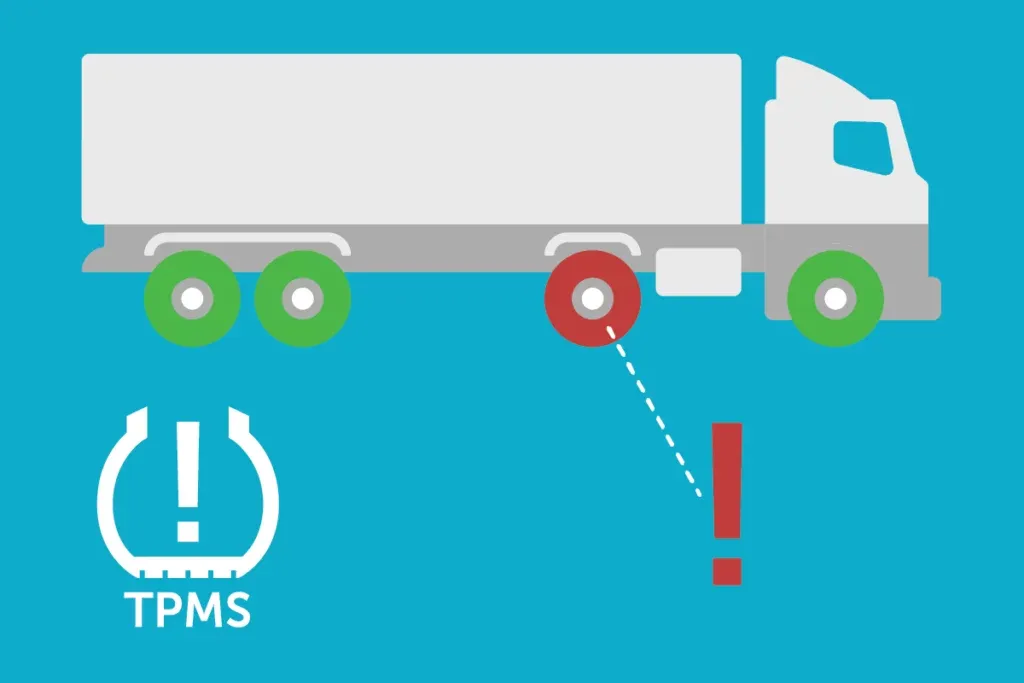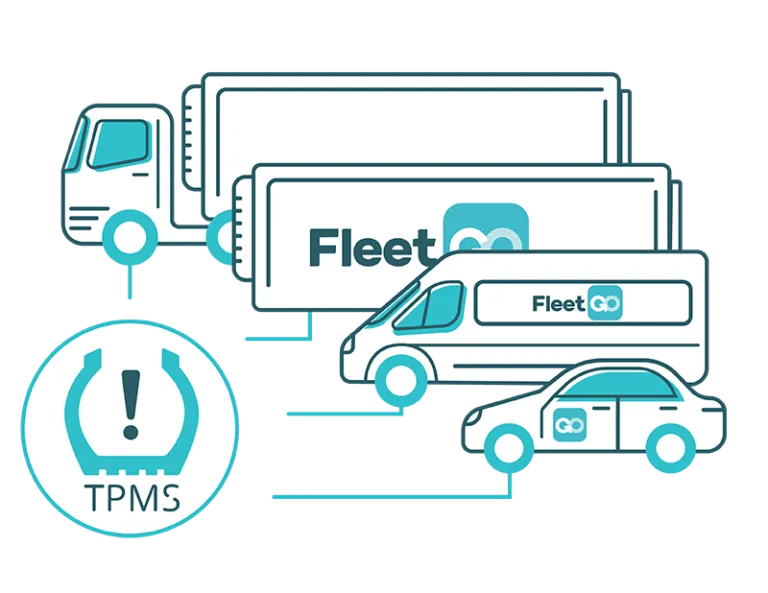Tyre pressure monitoring systems allow for the remote tracking of fleet tyre pressure, which carries with it a number of benefits, some of which may not be immediately obvious. In this post, we’re going to cover all of the benefits of a tyre pressure monitoring system for cars, as well as everything else that vehicle owners need to know about them.

What Is a Car Tyre Pressure Monitoring System?
As the name implies, a tyre pressure monitoring system is a system that can automatically notify the driver when tyre pressures are getting low. These systems are relatively standard in modern cars, but the type of TPMS tyre pressure monitoring system typically found in cars is quite limited. That’s because it only registers a significant change in pressure but doesn’t know what the actual pressure is. In short, it’s great for keeping a driver from continuing on a flat tyre, but that’s all.
The type of tyre pressure monitoring systems UK companies use for their fleets are a little more advanced, presenting actual pressure information. This allows a driver or organisation to stay on top of their tyre pressures without the need to perform regular manual checks. And, with remote tyre pressure monitoring systems, all this data can be monitored in real time across the whole fleet.
Remote Tyre Pressure Monitoring System
Prevent vehicle breakdowns by keeping perfect control over the pressure of your tyres. Prevent flats and save on fuel.
Increase the lifetime of your tyres

What Are the Benefits of a Car Tyre Pressure Monitoring System?
We know what these systems are, but why are they so important? And what are the main benefits of using them? Below are the main advantages that a pressure monitoring system provides:
Avoid accidents
Soft tyres can cause problems with handling, which increases the chances of an accident happening. In addition to the risk to the life of drivers — which is obviously the biggest concern — accidents can result in significant expenses through damaged goods, missed deliveries and raised insurance premiums.
Stay clear of legal trouble
UK law on commercial vehicles states that tyres must be suitably inflated for the purpose that the vehicle is being used. Of course, having tyres that are a little soft is unlikely to create legal problems by itself as it wouldn’t be that noticeable. It would likely only be detected if a vehicle was undergoing a police or DVSA spot check.
However, if a tyre is soft enough to be noticed — or a vehicle spot check inspection catches it — there is a maximum fine of £2,500 that can be accompanied by a discretionary disqualification and penalty points. These penalties are per tyre, and considering the fact that having 12 penalty points is an instant driving ban in the UK, it means that a company could easily lose a driver if tyres are maintained to the required standards. It is not required to have a tyre pressure monitoring system per UK law, but having one installed can help avoid legal issues relating to tyre pressure.
Increase the life of tyres
Having soft tyres puts additional stress on the structures that make up the tyre. This additional stress can result in the walls of the tyre cracking — which itself is an offence — but, more critically, it increases the chances of having a blowout.
A tyre blowing out is bad on any vehicle as it can result in loss of control and a serious accident, but it is particularly bad on heavy goods vehicles, where the fallout from such an accident can result in a much greater degree of damage. Beyond the risk of a blowout, having soft tyres just generally accelerates the wear and tear of a tyre, which means more expense due to replacing tyres more often.
Improve fuel economy
Softer tyres increase the resistance a vehicle has to overcome when in motion, as there is a greater surface area in contact with the road. This mechanic is exploited by drivers who become stuck in snow, mud or other similar situations. Letting air out of tyres increases the vehicle’s grip, but commercial vehicles are rarely in such situations.
In a normal driving situation, this increased friction means the vehicle has to expend more fuel than it would with fully-inflated tyres. In turn, this means greater fuel costs. Over the course of a year, particularly for companies with a large fleet, properly keeping tyres inflated can result in tremendous savings.
How Does a Tyre Pressure Monitoring System Work?
Tyre pressure systems can work in a couple of ways, with the different systems having different limitations. Here are the two main systems:
Indirect TPMS
Indirect systems use wheel speed sensors to compare the rotation rate of each wheel against each other and against other information available to the vehicle’s computer. By comparing all of this information, the onboard computer can essentially guess that a tyre is underinflated from its rotational speed. In essence, this type of system doesn’t monitor tyre pressure — it monitors for the effects created by low tyre pressure.
This system has the advantage of not relying on additional sensors, but it has the disadvantage of not providing any tyre pressure information. It is also very susceptible to inaccurate readings if, for example, the wheels are changed for a different size or one tyre is more worn than the rest. The system also needs to be reset whenever the tyres are changed or rotated.
Direct TPMS
Direct systems use sensors inside the actual tyre and can provide a wealth of data beyond just pressure readings. These sensors wirelessly transmit information to the vehicle’s computer, and with remote monitoring systems, that information can then be transmitted to the vehicle depot, allowing for an entire fleet’s tyre pressures to be monitored.
This system has many advantages, such as providing more data, being more accurate and not requiring resetting after proper inflation. The main disadvantage is that it involves an actual sensor in the tyre, which could be damaged and must be replaced when the battery runs flat.
Conclusion
As we’ve covered, under-inflated tyres are bad for fleets for a number of reasons. The best tyre pressure monitoring system UK companies can choose depends on their specific needs, but it is certainly advisable to have a system in place.
Disclaimer
This content is provided for informational purposes only and is not meant to be an endorsement or representation by FleetGO.com or any other party. This information may contain inaccuracies or typographical errors, despite our efforts to ensure accuracy. FleetGO.com accepts no responsibility or liability for any errors or omissions, and is not responsible for the contents of any linked website or any link contained in a linked website. Please refer to our full disclaimer for more details.


